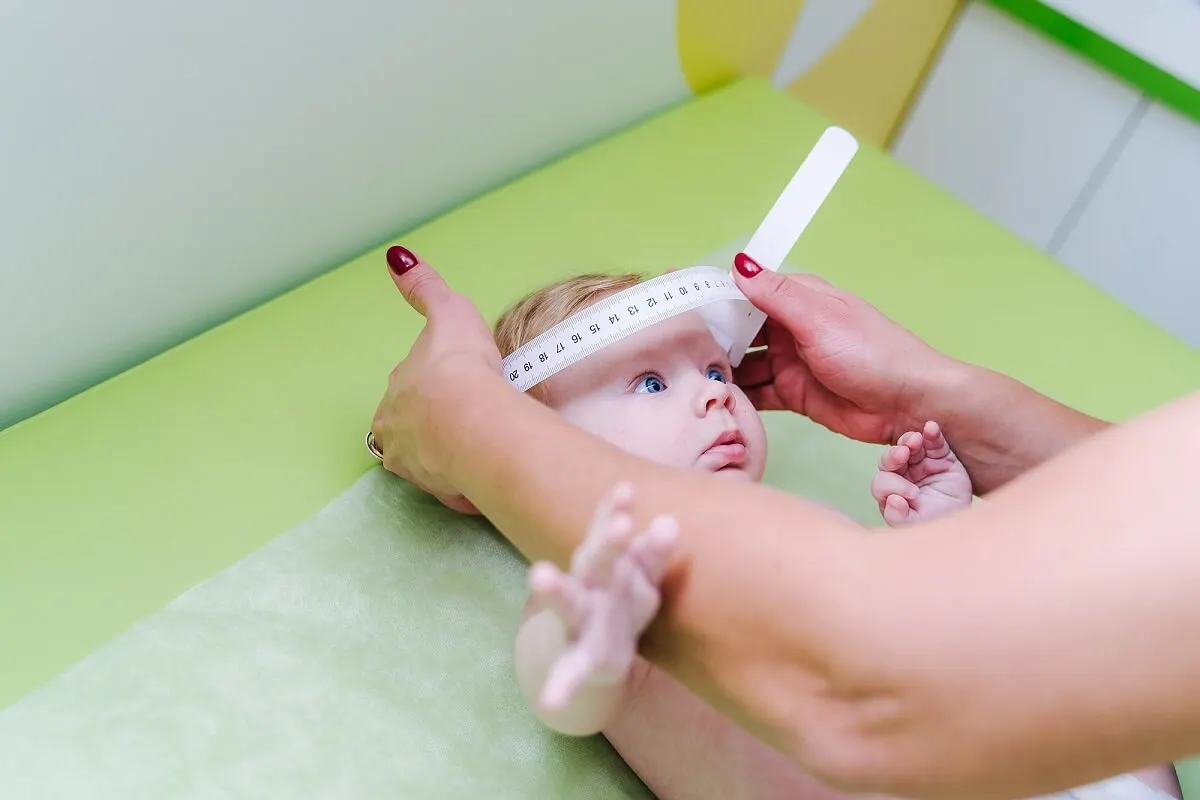The Ideal Weight for Children According to Their Age


Reviewed and approved by the doctor Leonardo Biolatto
The ideal weight for children isn’t absolute, it’s relative. It depends on age, sex and height, among other factors. What is certain is that it’s an important reference value.
The figure should be taken only as a point of reference. The fact that a child doesn’t conform to this figure doesn’t mean that he/she has a serious problem. The pediatrician is in charge of making the assessment in each particular case.
How is the ideal weight for children calculated?
The way to calculate the ideal weight for children varies depending on their age. In general, 3 ages are taken as a reference point:
- Before the age of 2 years
- Between 2 and 5 years old
- More than 5 years old
1. Before 2 years of age
Before 2 years of age, a concept known as percentile is used. The percentile allows us to know how the baby’s weight compares to other babies of the same age and sex.
For example, if a child has a 90% percentile of weight, this means that only 10% of the children weigh more than him/her. Thus, at each visit to the pediatrician, the expert calculates their percentile and determines if there are nutritional problems.
The meaning of the percentiles is as follows:
- Less than 3: indicates low weight.
- Between 3 and 85: implies normal weight.
- Between 85 and 97: implies excess weight.
- More than 97: there is obesity.
Read more here: NAOS Pyramid: Strategies to Prevent Juvenile Obesity
2. Between 2 and 5 years old
Between 2 and 5 years of age, the ideal weight for children is calculated according to the child’s height. In this case, as well as in the previous one, and even though there are ideal values, what experts take into account is that the child is in an adequate range and that its development is constant.
3. After 5 years of age
After the age of 5, the value taken into account is the body mass index (BMI). This is also calculated based on weight and height.
The formula for calculating BMI is weight in kilograms divided by height in meters squared. Let’s see an example:
Weight: 22 kilograms.
Height: 1.2 meters
Applying the formula:
IMC = 22 / (1,2)2 = 15,27)
The BMI value is compared with standardized tables developed by the World Health Organization (WHO). This establishes whether the child is of ideal weight, underweight, overweight, or obese. It should be remembered that obesity in children has increased in recent years.

The ideal weight in the first two years
At the time of birth, it’s considered normal for a baby to weigh between 2500 and 4500 grams (between 5.5 and 9.9 lbs). The most ideal range is between 3200 and 3400 grams (7 to 7.5 lbs).
If it weighs less than 2500 grams, the child is underweight. If they weigh more than 4500 grams, they’re considered overweight.
During the first days of life, babies tend to lose between 5 and 7% of their weight. However, they regain it in the following 15 days. From then on, they usually gain about 150 grams per week (6 oz).
The following table shows the ideal weight according to age and sex during the first two years of life:
| Age | Weight girls | Weight boys |
| At birth | 2.3 – 4.4 kg | 2.3 – 4.6 kg |
| 1 month | 3.0 – 5.7 kg | 3.2 – 6.0 kg |
| 2 months | 3.8 – 6.9 kg | 4.1 – 7.4 kg |
| 3 months | 4.4 – 7.8 kg | 4.8 – 8.3 kg |
| 4 months | 4.8 – 8.6 kg | 5.4 – 9.1 kg |
| 5 months | 5.2 – 9.2 kg | 5.8 – 9.7 kg |
| 6 months | 5.5 – 9.7 kg | 6.1 – 10.2 kg |
| 7 months | 5.8 – 10.2 kg | 6.4 – 10.7 kg |
| 8 months | 6.0 – 10.6 kg | 6.7 – 11.1 kg |
| 9 months | 6.2 – 11.0 kg | 6.9 – 11.4 kg |
| 10 months | 6.4 – 11.3 kg | 7.1 – 11.8 kg |
| 11 months | 6.6 – 11.7 kg | 7.3 – 12.1 kg |
| 12 months | 6.8 – 12.0 kg | 7.5 – 12.4 kg |
| 15 months | 7.3 – 12.9 kg | 8.0 – 13.4 kg |
| 18 months | 7.8 – 13.8 kg | 8.4 – 9.7 kg |
| 20 months | 8.2 – 14.6 kg | 8.9 – 15.0 kg |
| 24 months | 8.7 – 15.5 kg | 9.3 – 15.9 kg |
You might also be interested in: Vitamin D and Weight Loss: How Are They Related?
From 2 to 5 years of age
During the first 18 months of life, the child manages to triple its birth weight. At 2 years of age, it should have quadrupled.
Thereafter, weight gain begins to slow down, which is to be expected.

Between the ages of 2 and 5 years, the child is expected to gain just under 2 kilograms (4.4 lbs) per year. The following table illustrates the ideal weight range for boys and girls:
| Age | Weight girls | Weight boys |
| 27 months | 9.2 – 16.4 kg | 9.7 – 16.7 kg |
| 30 months | 9.6 – 17.3 kg | 10.1 – 17.5 kg |
| 33 months | 10.0 – 18.1 kg | 10.5 – 18.3 kg |
| 36 months | 10.4 – 19.0 kg | 10.8 – 19.1 kg |
| 4 years | 11.8 – 22.6 kg | 12.2 – 22.1 kg |
| 54 months | 13.5 – 23.0 kg | 14.06 – 22.6 kg |
| 5 years | 14.3 – 24.9 kg | 14.8 – 24.4 kg |
The ideal weight after the age of 5
Once the 5-year barrier is crossed, there’s a change in the way children’s weight evolves. From then on, they gain about 2.4 kilograms per year (5.3 lbs) until they reach puberty.
The ideal weight ranges up to 18 years of age are expressed in the following table:
|
Age | Weight girls | Weight boys |
| 6 years | 16.01 – 28.92 kg | 16.5 – 28.27 kg |
| 7 years old | 17.73 – 33.37 kg | 18.26 – 32.53 kg |
| 8 years | 19.54 – 38.54 kg | 20.11 – 37.42 kg |
| 9 years old | 21.59 – 44.58 kg | 22.08 – 43.07 kg |
| 10 years old | 23.99 – 51.43 kg | 24.19 – 49.42 kg |
| 11 years old | 26.82 – 58.72 kg | 26.6 – 56.26 kg |
| 12 years old | 30.02 – 65.9 kg | 29.47 – 63.31 kg |
| 13 years | 33.41 – 72.38 kg | 32.97 – 70.28 kg |
| 14 years | 36.7 – 77.69 kg | 37.07 – 76.96 kg |
| 15 years | 39.59 – 81.65 kg | 41.52 – 83.24 kg |
| 16 years | 41.83 – 84.37 kg | 45.79 – 88.95 kg |
| 17 years | 43.34 – 86.17 kg | 49.29 – 93.78 kg |
| 18 years | 44.25 – 87.43 kg | 51.69 – 97.25 kg |
Ideal weight for children is a dynamic and not a static concept
It’s very important for children to stay in the ideal weight range, especially during the first years of life. Those who achieve this are less likely to have problems with their weight in adulthood.
However, it’s worth emphasizing that “ideal weight” is a range. Variations can be kept within the normal range.
If your child’s weight changes suddenly, there’s most likely a health problem. The best thing to do would be to consult a pediatrician.
All cited sources were thoroughly reviewed by our team to ensure their quality, reliability, currency, and validity. The bibliography of this article was considered reliable and of academic or scientific accuracy.
- Asociación Española de Pediatría. (2023). Gráficas de crecimiento y percentiles. AEP en Familia. Consultado el 12 de noviembre del 2024. https://enfamilia.aeped.es/edades-etapas/graficas-crecimiento-percentiles
- Centers for Disease Control and Prevention. (2021, 15 de septiembre). Acerca del índice de masa corporal para niños y adolescentes. CDC. Consultado el 12 de noviembre del 2024. https://www.cdc.gov/healthyweight/spanish/assessing/bmi/childrens_bmi/acerca_indice_masa_corporal_ninos_adolescentes.html
- Mattke, A. (2021). ¿Cuánto debo esperar que crezca mi bebé en el primer año? Mayo Clinic. Consultado el 12 de noviembre del 2024. https://www.mayoclinic.org/es-es/healthy-lifestyle/infant-and-toddler-health/expert-answers/infant-growth/faq-20058037
- MedlinePlus. (17 de febrero del 2024). Crecimiento y desarrollo normales. MedlinePlus. Consultado el 12 de noviembre del 2024. https://medlineplus.gov/spanish/ency/article/002456.htm
- MedlinePlus. (s.f.). Peso del bebé al nacer. MedlinePlus. Consultado el 12 de noviembre del 2024. https://medlineplus.gov/spanish/birthweight.html
- Servicio Andaluz de Salud, Consejería de Salud y Consumo. (29 de abril de 2019). Tablas de estándares de crecimiento OMS. Servicio Andaluz de Salud, Consejería de Salud y Consumo. Consultado el 13 de febrero de 2023. https://www.sspa.juntadeandalucia.es/servicioandaluzdesalud/el-sas/planes-integrales/tablas-de-estandares-de-crecimiento-oms
- Stanford Medicine. Children’s Health. (s.f.). Mediciones. Stanford Medicine. Children’s Health. Consultado el 12 de noviembre del 2024. https://www.stanfordchildrens.org/es/topic/default?id=newborn-measurements-90-P05784
This text is provided for informational purposes only and does not replace consultation with a professional. If in doubt, consult your specialist.








